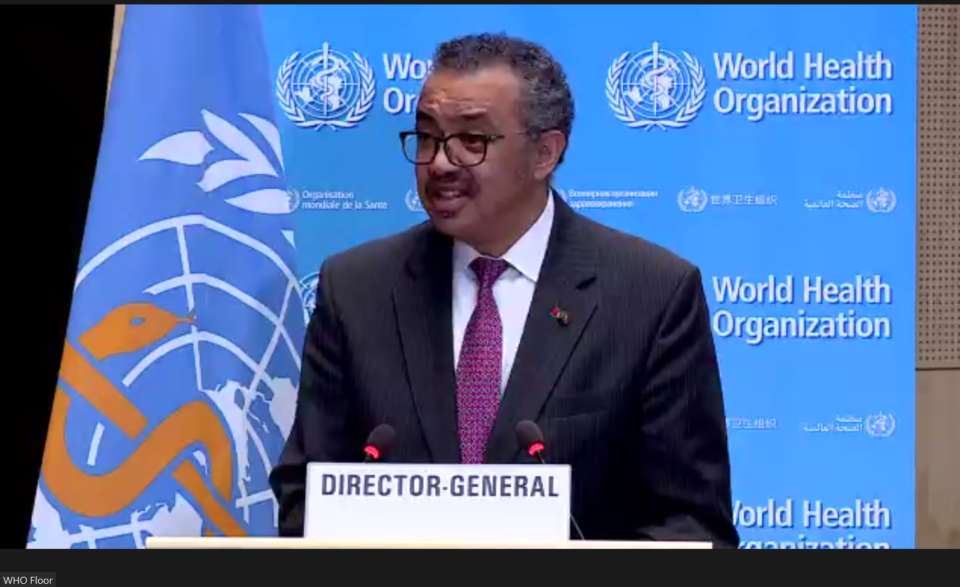IFPA at the 74th World Health Assembly
31 May 2021
By IFPA
Dominated by COVID-19
The discussion at the 74 World Health Assembly was dominated by COVID-19. Many member states of the World Health Organization (WHO) highlighted the importance of solidarity and concerted action against COVID-19, but low- and middle- income countries as well as WHO noted the apparent inequalities in vaccine distribution. In his opening remarks, the Director General of WHO, Dr Tedros, stated that “more than 75% of all vaccines have been administered in just 10 countries. There is no diplomatic way to say it: a small group of countries that make and buy the majority of the world’s vaccines control the fate of the rest of the world”. The goals of the facilities created by WHO for equal distribution of COVID vaccines is “to vaccinate at least 10 percent of the population of every country by September, and a “drive to December” to achieve our goal of vaccinating at least 30 percent by the end of the year”, but current data on percentages of vaccinated people worldwide shows that we are far from reaching these goals.
While still in the middle of the pandemic, countries are envisioning resilient health systems and a strengthened WHO, to be better prepared for future health emergencies. As part of pandemic preparedness, a possible “pandemic treaty” was advanced before the start of the Assembly but then postponed to an extraordinary session of the World Health Assembly to be held in November. In this special session, countries are to set up a process to evaluate different instruments for pandemic preparedness and response. Read more about the “pandemic treaty” here and here.

United for diabetes and disability
Other than the COVID-19 pandemic response, two gains for the psoriatic disease community were the resolutions on diabetes (“Reducing the burden of noncommunicable diseases through strengthening prevention and control of diabetes“) and on disabilities (“The highest attainable standard of health for persons with disabilities”).
The resolution on diabetes calls to strengthen diabetes prevention measures. Plans include health promotion to combat obesity, and establishment of a web-based tool for increasing transparency on diabetes-related products. In the report, references to screening and early detection are not as strong as those on prevention. More attention to screening would have been important to our community. Nevertheless, we can still brandish this resolution on diabetes to advocate for a person-centered care of psoriatic disease. IFPA fights for interventions such as weight loss or smoking cessation that are beneficial to both diabetes and psoriatic disease as outlined in our recent report “Inside Psoriatic Disease: Diabetes”.
The resolution on disabilities highlights the impact of the pandemic on this population, and urges member states to meaningfully involve people with disabilities in decision-making processes. The resolution calls for increased efforts in eliminating barriers and discriminations against persons with disabilities and invites non-governmental organizations to collaborate towards inclusion and best-practice sharing to obtain the highest attainable standard of health for persons with disabilities.
IFPA participated to the World Health Assembly as part of the delegation of the Global Health Council. IFPA supported two statements:
- on Agenda item 17 (WHO’s work in health emergencies and strengthening preparedness for health emergencies) and Agenda item 18 (Mental health preparedness for and response to the COVID-19 pandemic)
- on Agenda item 13.2 (Political declaration of the third high-level meeting of the General Assembly on the prevention and control of non-communicable diseases), Agenda item 13.3 (Expanding access to effective treatments for cancer and rare and orphan diseases, including medicines, vaccines, medical devices, diagnostics, assistive products, cell- and gene-based therapies and other health technologies; and improving the transparency of markets for medicines, vaccines, and other health products) and Agenda item 13.9 (Integrated people-centred eye care, including preventable vision impairment and blindness).
Check out IFPA's resources on psoriatic disease and diabetes
tool Comorbidities, Toolkits ...
Your diabetes checklist
tool Comorbidities, Toolkits ...
Social media toolkit on psoriatic disease and diabetes
Sign up to our newsletter